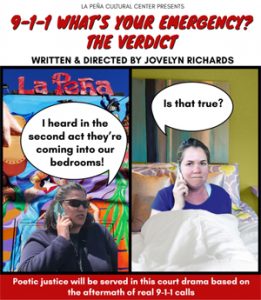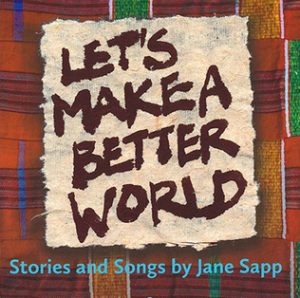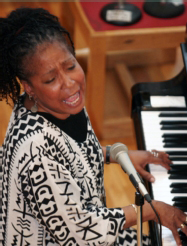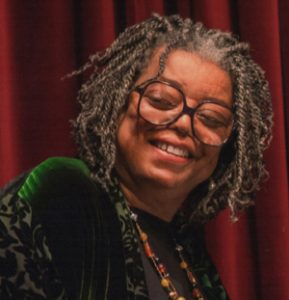WomenArts stands in solidarity with the many individuals and organizations calling for racial justice in these troubled times. Many women artists of color have been addressing racial issues through their art for decades, and we feel their voices are more important than ever now. Today we are sharing some wisdom from three of our favorite long-term colleagues – Jane Sapp, Mary D. Watkins, and Jovelyn Richards. We hope they will inspire you to use your creativity to keep working for a better future in spite of these dark times.
Jane Sapp: “We Know How to Make A Way Out of No Way”
“Too often social change work focuses on what communities don’t have: there aren’t enough economic resources; the education system is not responsive; and racism keeps Black people from reaching their full potential. But I began to wonder what would happen if we focus on what we do have rather than our deficiencies. We have each other, our songs, our stories, our imaginations, our experiences surviving and making ugly beautiful. We know how to make a way out of no way.” – Jane Sapp in the introduction to “Let’s Make a Better World“
Jane Sapp is a nationally admired cultural worker, musician, educator, and activist whose approach to social transformation is rooted in African American musical traditions. In her new book, Let’s Make a Better World, Jane tells the story of her childhood, nurtured by the Black community while living in the brutal world of the Jim Crow South. She describes her participation in the Black Power movement and introduces us to mentors who shaped her path to becoming a cultural worker.
Jane has done a lot of work with inner-city young people and community groups, and this book is an especially great resource if you are looking for uplifting songs for young people about racial justice and cultural identity, because she shares scores and lyrics for songs she has written with the children and others.
You can hear some of the songs on her album, We’ve All Got Stories: Songs from the Dream Project. You can also watch Julie Akeret’s excellent hour-long documentary about Jane Sapp for free at the Culture Unplugged website, Someone Sang for Me (2002).
Mary D. Watkins: Showing the Dignity and Strength of Civil Rights Workers
“My goal has been to show the dignity and strength with which Fannie Lou Hamer and her fellow civil rights workers carried themselves in spite of the terror and dehumanizing treatment they were subjected to and to convey the great spirit of love that bound them together.”
“Their story deserves to be told in a grand way – a way befitting the souls of the people who marched in the streets in the hot sun with such determination, singing through their fears while their opponents spat upon them beat them, kicked them, called them vile names, terrorized their families, and imprisoned them.” – Mary D. Watkins describing her opera, “Dark River: The Fannie Lou Hamer Story“
Mary D. Watkins has written two operas about the civil rights movement, Dark River: The Fannie Lou Hamer Story (2009), and Emmett Till: The Opera (2020). Fannie Lou Hamer was one of the first African-Americans to register to vote in Mississippi in 1962, and Dark River is about her leadership in the struggle to obtain voting rights for her people. She was a key figure in the passage of the Voting Rights Act of 1965, that prohibited racial discrimination in voting from 1965 until 2013 when the U.S. Supreme Court weakened its enforcement provisions.
The video clip below shows the finale of Act 1 from the 2014 production of Dark River at Mount Holyoke College, conducted by Tian Hui Ng. In this scene, members of the Student Non-Violent Coordinating Committee sing “Freedom Now” as they rally and march to demand their freedom.
Jovelyn Richards – “The Strength to Take on Stories That Will Move Humanity Forward”
“My purpose for practicing my writing rituals is to let my muse know I am strong enough and brave enough to take on the stories that will move our humanity forward, and that I am wise enough to know that cultural barriers are made from fear, and human interconnection is made from walking through that fear. What characters have been waiting in the shadows like the animals who have recently emerged during our shelter in place? I will do my part in widening the emotional spiritual landscape through storytelling.” Jovelyn Richards from her essay on “How to Honor Our Muses in Challenging Times”
Jovelyn Richards often explores the wisdom and resilience of her ancestors who survived in spite of the dehumanizing forces of slavery and legalized segregation. For instance, her novel, Tulips for Evening, deals with race relations in the South immediately after the Civil War. Her mesmerizing solo piece, Come Home, is about African-American soldiers returning from World War II to their homes in the segregated South.
 Her recent play, 911: What’s Your Emergency? (2018), is her response to the white people, mainly women, who have been calling the police to report people of color for ordinary activities like barbecuing at local parks, selling bottled water, falling asleep in a library, or simply being in a predominantly white environment. She examines the emotional lives of all of the people involved so that audiences will understand that these calls are not isolated incidents – they are part of a larger pattern of systemic racism and class warfare.
Her recent play, 911: What’s Your Emergency? (2018), is her response to the white people, mainly women, who have been calling the police to report people of color for ordinary activities like barbecuing at local parks, selling bottled water, falling asleep in a library, or simply being in a predominantly white environment. She examines the emotional lives of all of the people involved so that audiences will understand that these calls are not isolated incidents – they are part of a larger pattern of systemic racism and class warfare.
She has written, “I believe that in order to heal ourselves and our society, we need to reach deep inside ourselves, past the broken parts of our bodies and spirits, past our pain, and past our reactions to the hatred and humiliation we experience so often. We need to find our love, that deep positive core of our humanity, and learn to live our lives from that place in our hearts.”
Jovelyn recently wrote an essay for the Playwrights Center in Minneapolis exploring her responsibility as an artist during these challenging times. It’s a great place to start if you are looking for some suggestions on ways to stay grounded:
How to Honor Our Muses During Challenging Times: Cultivating Rituals To Face Fear and the Unknown.




